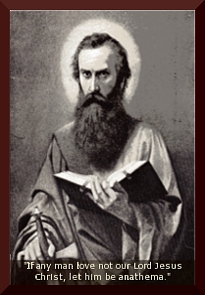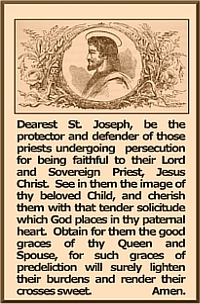
“Pope Francis will have to give an account to God.”
The ex-bishop of of Ciudad del Esta, Paraguay, Bishop Livieres, has recently published another letter which our friend Jose Sarto posted today on his blog Página Católica. The translation from the Spanish is ours: ++++++++++++++++++++++++++++++++++
The Catholic Church is one; there are not several churches of Christ. But if we look at her in a [purely] human way today, we find that within her, there are very contradictory modes of thinking and living the faith. I do not refer to different modes of thinking and living the same faith, something which is perfectly legitimate. Rather, we see that different kinds of “faith” are given within it. I stress, humanly speaking, because the Catholic faith is one: what has been believed and practiced everywhere, and always by all Catholics as St. Vincent of Lerins said – what was taught by Jesus Christ and transmitted by the living Magisterium of His only Church.
However, it must be acknowledged that within the Catholic Church, incompatible modes of thinking have coexisted for decades. Already, Cardinal Ratzinger had pointed it out in his famous book about the faith, The Ratzinger Report, which came out in 1985. The dissident groups, instead of voluntarily leaving the Church, or being declared outside the faith and her discipline, remain within it, despite denying [the Church’s] most fundamental principles.
Someone as foreign to theological disputes as Jean-Marie Guénois, a journalist quite sympathetic to all kinds of changes within the Church, has acknowledged in a recent article in the French Le Figaro, that “de facto schisms exist within the Church among many priests and faithful who, for example, no longer accept the Catholic faith on the Virgin Mary, the Eucharist; and who call themselves Catholics when they are, better than Christian, authentic Protestants… The Synod opens a crisis in the Church in the old sense of the word, that is, in the imposing of [the necessity to make] a choice or a decision… It may be that the shock of the Synod opens the eyes of some.”
This that Guénois points out is evident. Does it not seem that today the Church is a conglomerate of contradictory beliefs, that one priest says one thing and another something else, as for example, in the Anglican Communion?
There exist among us, along with the Catholic faith, schisms and heresies along the length and the width of the planet. Those who promote them have declared that it is much more efficient and profitable to remain within the Church, to not depart from her, to work from her interior. They even assume important posts in her government and presume to speak on her behalf, to represent her.
In the last decades, the Church hierarchy knew how to go about finding ways to avoid institutional divisions in the face of this heterodoxy diffused throughout many countries, surroundings and social classes. At times, she succeeded by looking for a consensus through doctrinal formulas more or less acceptable for all, even though, in this way, diluting truths that seemed “difficult”.
The truth is that even in those cases in which valiant contributions and doctrinal precisions were made (Consider the marvel of so many papal documents of these decades), frequently, there was a lack of firmness in implementation, in disciplinary correction and in pastoral practice. One hand erased what the other had written.
For example, going against the current, and under enormous pressure from the media, Paul VI heroically reaffirmed Catholic morality in his encyclical Humanæ Vitæ. However, those who publicly opposed his teaching were allowed to continue acting and preaching “as if it were nothing”. And how many priests and even bishops, although they did not publicly criticize it, simply ignored the Magisterium of the Pope in the confessional, and allowed or even recommended the use of artificial methods of contraception as well as other serious moral disorders!
After more than half a century of this style of Government “light”, in which coexistence with doctrinal error and pastoral and disciplinary disobedience was not missing, we can see much more clearly that then, it was not the good road required for the circumstances, but that, on the contrary, it has been the cause of many wayward paths which now, regretfully, have reached unsuspected heights and magnitudes.
We have had decades of bad formation in many seminaries and theological faculties. Educated in this environment, some bishops and Cardinals during the recent Synod on the family openly aired through their opinions, many of these confusions on issues as fundamental as the family, the intrinsic immorality of homosexual acts and adultery.
“The Synod opens a crisis in the Church in the old sense of the word, that is, in the imposing of [the necessity to make] a choice or a decision…” I am in complete agreement with this reflection of Mr. Guénois. All of us must choose and decide. None of us can “let the ball pass”.
We have to assume our baptismal vows of faith, be we bishops, priests, religious or laity; old or young; academically formed or with a simple faith. We must, as Jesus Christ and the Apostles, preach the faith “in due season or out of season”, and defend it from errors and deviations, be they on the doctrinal or pastoral level. Therein, we play out not only our salvation, but that of very many men and women who depend on our modest action as “useless servants”, although faithful.
With Peter and under Peter, the hour has now arrived for holy religious to come forth and to make themselves present, that, as new Saint Catherines of Siena, they remind the Church’s hierarchy of compliance with the discharge of their duties. And for bishops disposed to “play for keeps” in defense of the faith as modern Saint Athanasiuses. And Cardinals that imitate St. Paul and are not afraid to denounce deviations, acts and expressions which sow confusion. And laity, such as new St Thomas Mores, to be disposed to [making] the highest sacrifices, insisting on the indissolubility of marriage, not only at the doctrinal level, but even in the more difficult and politically costly pastoral cases. And also even of children who, like other Tarcisius saints, are willing to sacrifice themselves in order to maintain respect for Holy Communion, which one can only approach to receive when not living in sin.
With Peter and under Pedro, we all must renew our baptismal commitments and defend the integrity (without lapsing into fundamentalism) of the Catholic faith. St. Thomas Aquinas reminds us that, when it pertains to failure in what concerns faith and morals, fraternal correction should be made publicly, so that errors are not disseminated which may endanger the salvation of unsuspecting people.
Both the Catechism of the Catholic Church and its wonderful compendium, which sums it up and makes it precise, are true gems that can serve us all as “maps of the faith” – so we know where we stand, and by which road we need to proceed.
It is good that we appreciate them, study and know them deeply. We must defend what they teach us and correct errors that can misrepresent those truths. Not only in the field of doctrine. Also in the pastoral. Because we live as we think, or we will end up thinking how we live.
The same heroic hour which Paul VI faced when, against the current, he published Humanae Vitae, is thrust upon Pope Francis today. He is the custodian and supreme guardian of doctrine and the practice of the faith.
He is the custodian and the supreme guardian of the doctrine and practice of the faith. As with all popes, it is for him to be a loyal administrator who must confirm his brothers in the faith. Let us unite ourselves with him and fervently pray for him so as to accompany him with our filial love in this test with so many pressures and confusion.
We are at peace. A Pope may not formally teach error. What can happen, and has happened at times throughout the history of the Church, is that by means of silence and omissions, by means of appointments and promotions, of actions and gestures, authority contributes to the expansion of confusion, and the faithful, who are “fighting” in the missionary trenches of the edge of humanity become discouraged.
It happened in Galatia to St. Peter himself, the first Pope. After affirming the true doctrine at the Council of Jerusalem, he however, through human respect sowed confusion in Galatia. But the Lord did not abandon him: he had the grace of counting on the support and the fraternal correction which St. Paul gave him.
Love one another in the truth. That truth which, according to the promise of Christ, is the only one that will make all of us truly free.
S.E.R. Mons. Rogelio Livieres,
Ex-Obispo de Ciudad del Este.



